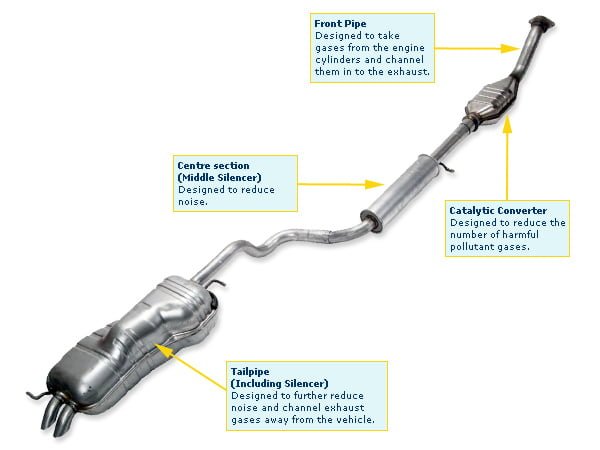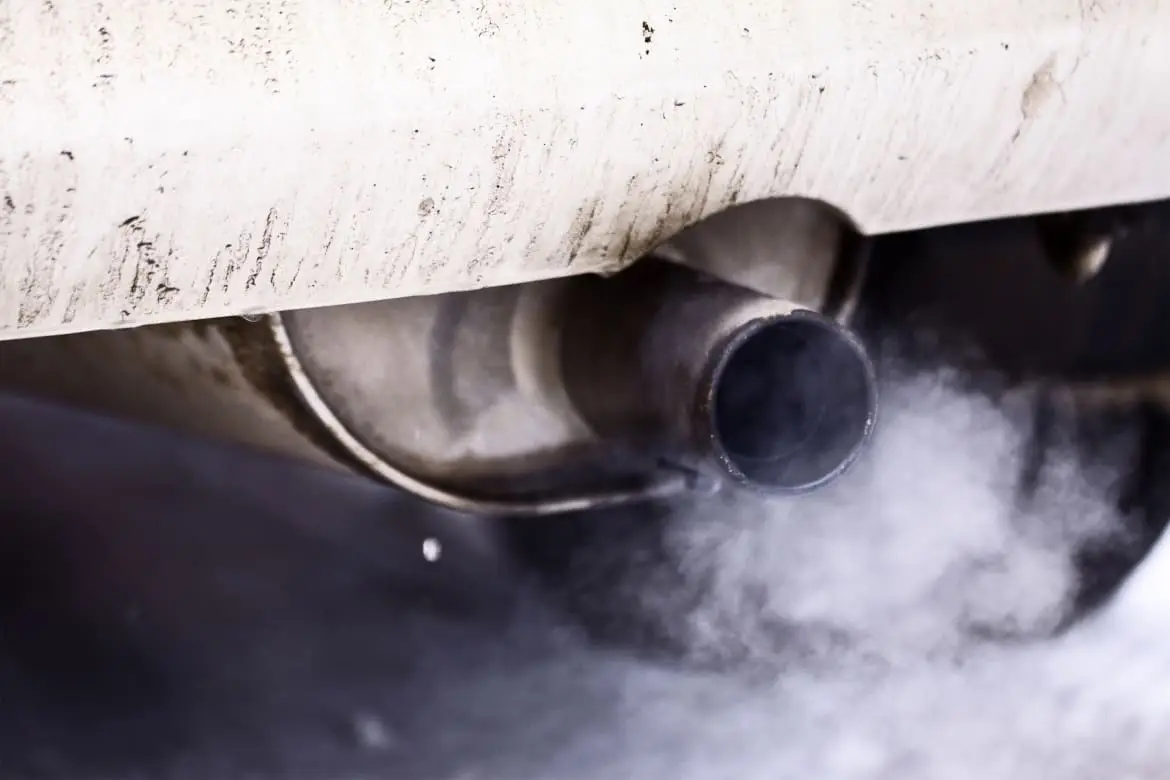Are you experiencing strange noises coming from your vehicle? Perhaps you’ve noticed a decrease in fuel efficiency or a distinct smell of exhaust fumes? These could all be signs of an exhaust leak, a common issue that can lead to serious problems if left unaddressed. In this guide, we will explore the telltale signs that indicate an exhaust leak, empowering you to quickly identify and resolve this issue before it becomes a major concern. Whether you’re a seasoned car enthusiast or a novice driver, understanding how to recognize the symptoms of an exhaust leak is crucial for maintaining the health and performance of your vehicle. So, let’s dive in and unravel the mystery behind this potential automotive headache!
Imagine cruising down the open road, wind in your hair and your favorite tunes playing, when suddenly you hear a peculiar hissing or rumbling sound. Your first instinct may be to turn up the volume or ignore it altogether, but don’t be too quick to dismiss it as a harmless quirk. That strange noise could be your vehicle’s way of telling you that you have an exhaust leak. But fear not! With the right knowledge and a keen eye (or ear), you can easily determine if your vehicle is suffering from this common issue. In this comprehensive guide, we will walk you through the various indicators of an exhaust leak, from unusual sounds to physical symptoms such as decreased fuel efficiency and a strong odor of exhaust fumes. By the end, you’ll be equipped with the necessary tools to diagnose and address an exhaust leak, ensuring your vehicle stays in optimal condition and keeping you safe on the road. So, let’s embark on this journey of discovery and learn how to know if you have an exhaust leak!
How to know if you have an exhaust leak:
- Listen for a loud hissing or popping sound coming from the exhaust system.
- Check for a strong smell of exhaust fumes inside the car.
- Look for black soot around the exhaust pipe or underneath the car.
- Feel for any vibrations or increased heat near the exhaust system.
- Watch for a decrease in fuel efficiency or engine performance.

How to Know if You Have an Exhaust Leak
An exhaust leak in your vehicle can be a serious problem that affects both its performance and your safety. Recognizing the signs of an exhaust leak is crucial in order to address the issue promptly. In this article, we will guide you through the step-by-step process of determining whether or not your vehicle has an exhaust leak.
Step 1: Listen for Unusual Noises
One of the most common indications of an exhaust leak is the presence of unusual noises coming from your vehicle. If you notice a loud hissing or popping sound, particularly when you accelerate or idle, it may be a sign of a leak in the exhaust system. Pay close attention to any changes in the sound of your engine, as this can be a strong indicator of an issue.
Additionally, if you hear a rattling noise underneath your vehicle, especially when driving over bumps or rough roads, it could signify a loose or damaged exhaust component. Take note of any new or unusual sounds and proceed to the next step to further investigate.
Step 2: Check for Foul Smells
An exhaust leak can also produce distinct odors that differ from the usual exhaust fumes. If you notice a strong smell of sulfur or rotten eggs inside or outside your vehicle, it is likely that there is a leak in the exhaust system. This odor is caused by the presence of hydrogen sulfide, which is a byproduct of a faulty exhaust system. Pay attention to any unusual smells, especially when your vehicle is running, and proceed to the next step for a thorough inspection.
Additionally, if you experience symptoms such as headaches, dizziness, or nausea while driving, it could indicate exposure to carbon monoxide (CO) gas. CO is a toxic gas that can leak from a damaged exhaust system, and it poses a serious health risk. If you suspect a CO leak, it is crucial to address the issue immediately for your safety and the safety of others.
Step 3: Perform a Visual Inspection
A visual inspection is another important step in determining if you have an exhaust leak. Start by examining the exhaust system components, such as the muffler, pipes, and connections, for any visible signs of damage, corrosion, or rust. Look for cracks, holes, or loose connections, as these are common indications of a leak.
During your inspection, pay attention to any black sooty deposits around the exhaust system, as they can indicate a leak. These deposits are caused by the escaping exhaust gases leaving residue behind. Additionally, check for any white smoke or steam coming from the exhaust pipe, as this can also be a sign of a leak.
Step 4: Seek Professional Help
If you have followed the previous steps and suspect that your vehicle has an exhaust leak, it is recommended to seek professional assistance. An experienced mechanic will have the necessary tools and expertise to accurately diagnose and repair the issue. They will be able to perform further tests, such as a pressure test or using a smoke machine, to pinpoint the exact location of the leak.
Remember, addressing an exhaust leak promptly is crucial for both your vehicle’s performance and your safety. Ignoring the problem can lead to more serious issues and potentially harmful exposure to toxic gases. Therefore, it is always best to consult a professional to ensure the proper repair of your exhaust system.
Frequently Asked Questions
Here are some common questions about how to know if you have an exhaust leak:
What are the signs of an exhaust leak?
An exhaust leak can be indicated by several signs. One of the most noticeable signs is a loud roaring or hissing noise coming from the engine or exhaust system. You may also notice a strong smell of exhaust fumes inside or outside the vehicle. Additionally, if you experience a decrease in fuel efficiency or notice black sooty residue on the exhaust pipe, it could be an indication of an exhaust leak.
Another sign of an exhaust leak is a vibrating or shaking sensation in the steering wheel, floorboards, or pedals. This is caused by the abnormal pressure in the exhaust system. If you notice any of these signs, it is important to have your vehicle inspected by a professional mechanic to determine the exact cause and address any potential issues.
How can I check for an exhaust leak?
There are a few methods you can use to check for an exhaust leak. One way is to visually inspect the exhaust system for any visible signs of damage, such as holes, cracks, or loose connections. You can also listen for any unusual noises coming from the engine or exhaust system, such as a loud hissing or popping sound.
Another method is to use a soapy water solution. Apply the solution to the connections and joints of the exhaust system while the engine is running. If you see bubbles forming, it indicates a leak. However, it is important to exercise caution and avoid direct contact with hot surfaces to prevent burns. If you are unsure or unable to check for an exhaust leak yourself, it is recommended to seek professional assistance.
Can an exhaust leak be dangerous?
Yes, an exhaust leak can be dangerous. The exhaust gases produced by the engine contain toxic substances, such as carbon monoxide, which can be harmful when inhaled in high concentrations. If there is a leak in the exhaust system, these gases can enter the vehicle cabin and pose a health risk to the occupants.
In addition to the health risks, an exhaust leak can also affect the performance and efficiency of the vehicle. It can cause a decrease in fuel efficiency, as well as impact the overall engine performance. Therefore, it is crucial to address any exhaust leaks promptly to ensure the safety of both the occupants and the vehicle.
Can I drive with an exhaust leak?
While it is possible to drive with an exhaust leak, it is not recommended. Driving with an exhaust leak can have several negative consequences. Firstly, the toxic gases released from the leak can enter the vehicle cabin and pose a health risk to the occupants. Carbon monoxide, in particular, can be life-threatening when inhaled in high concentrations.
Furthermore, an exhaust leak can lead to decreased fuel efficiency and engine performance. It can also cause damage to other components of the exhaust system, such as the catalytic converter. Therefore, it is best to have an exhaust leak repaired as soon as possible to avoid any potential hazards and prevent further damage to the vehicle.
How much does it cost to fix an exhaust leak?
The cost of fixing an exhaust leak can vary depending on several factors, such as the extent of the damage, the type of vehicle, and the specific repairs needed. In some cases, a minor exhaust leak can be fixed by replacing a gasket or tightening a connection, which may cost around $100 to $200.
However, if the damage is more severe and requires replacing a larger component of the exhaust system, such as the catalytic converter or muffler, the cost can range from a few hundred dollars to over a thousand dollars. It is recommended to consult with a professional mechanic for an accurate assessment of the repair cost based on your specific situation.

If you suspect an exhaust leak, it is always advisable to consult a qualified mechanic who can accurately diagnose and repair the issue. Regular maintenance and inspections can also help prevent exhaust leaks from occurring in the first place. By taking proactive measures and staying vigilant, you can ensure the longevity and safety of your vehicle, as well as contribute to a cleaner and healthier environment for all.
